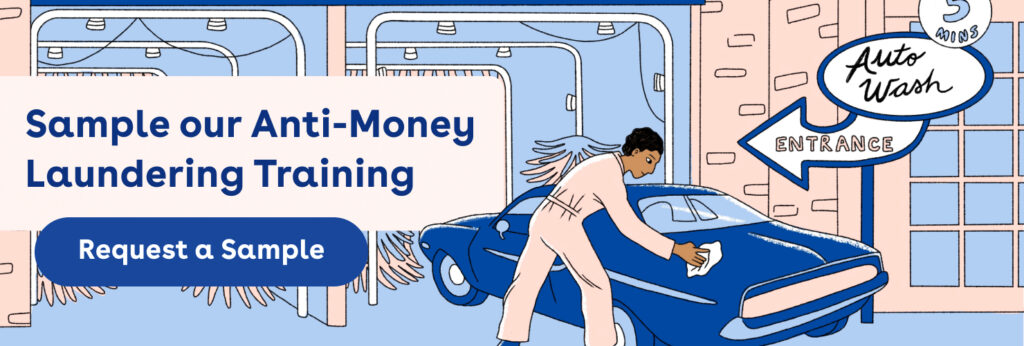In this article
Which business types are especially high-risk for money laundering
5 tips on money-laundering prevention
Why your workforce might need anti-money laundering (AML) training
All right, it’s time to talk about money laundering. It’s one of those somewhat puzzling but very work-related topics (especially of late) that we see frequent glimpses of in the news — which is why Ethena created a whole course about its prevention.
Hopefully, it won’t disappoint you to learn that there will be no laundry-related activities required of you while reading this article, although feel free to pause here and toss in a load of towels, should you appreciate a solid multi-tasking opportunity.

What is money laundering?
It is the process of turning (typically) large sums of money that were procured illegally into cash that appears legitimate. Profits from criminal activities (like drug trafficking and terrorism, for instance) are made to appear clean or “laundered” through a three-step injection into the economy so no one suspects their sordid and suspect origins.
What types of businesses need to be on high alert for money-laundering activities?
Given that money laundering aims to disguise large sums of “dirty” money as legit cash, businesses with a high cash volume tend to be particularly attractive to criminals. Examples have included:
- Laundromats
- Used car dealerships
- Casinos
- Car washes
- Restaurants
- Street vendors
But let’s fast forward to, well, the 21st century. We live in a digital world rife with online banking, cryptocurrency transactions, and trailblazing fintech organizations, leaving us vulnerable to potential financial crime on multiple fronts. In recent years, funds have been laundered by banking institutions on behalf of drug cartels. And all manner of money service businesses (MSBs) continue to be investigated whenever authorities suspect them of being non-compliant with anti-money laundering laws.
The point here is that money laundering is more widespread than we may realize.
How do money laundering schemes work?
As you might imagine, placing ill-gotten gains into a legitimate system requires some complex steps. We go into greater detail in Ethena’s AML course naturally, but here are the three stages of money laundering that need to be present:
- Placement — money is placed into the financial system, for example through a bank deposit
- Layering — to cover up its origins, the money will move through a series of financial transactions to make it difficult to decipher where it started (suddenly that phrase “follow the money” really makes sense, doesn’t it?)
- Integration — finally, that money is used in supposedly legitimate transactions, like the purchase of high-end assets or investments (you’ll find some more examples below)
What are some examples of money laundering?
Glad you asked — it helps to know what these things look like in the real world, right? Here are some ways that dirty money can be manipulated so it appears to be squeaky clean:
- Dropping bundles of cash into online auctions or sales for, say, artwork, jewelry, or even virtual-gaming websites
- Hiring cash smugglers or “mules” to transport cash across borders where anti-money laundering legislation may be less strictly enforced
- Breaking up large amounts of cash through cashier’s checks or money orders and depositing them in separate transactions
- Buying real estate property with cash and then flipping it for a quick sale in the hopes that no one will have time to ask questions
5 anti-money laundering tips to keep in mind
We’ve shared a few of the ways that money-laundering activities can infiltrate legitimate businesses. Now it’s only fair that we also reassure you about the key practices to prevent money laundering so we can keep companies like yours on the right side of the financial track.
Here’s a high level overview of some anti-money laundering tips:
- Incorporate policies and systems to curtail money laundering through formal risk assessments — and make sure employees are aware of their existence and can access them
- Assign an AML officer as the designated internal resource
- Offer AML employee training (Ethena’s a great resource for this, if we do say so ourselves.)
- Conduct independent audits and testing, or processes like transaction monitoring if applicable
- Know your customer and their business practices so that red-flag behaviors stand out like a sore thumb
Anti-money laundering made easy — through Ethena’s training
Utilizing AML training ensures everyone, from senior leadership to new hires, can get a baseline understanding of how to identify — and handle — red flags associated with money laundering. And it gives employees the confidence to raise and report concerns. In turn, this mitigates risks for your company, clients, and employees.
Why you need AML compliance training at your company
1. It’s required — legally — and expected if you operate in the financial sector.
As a financial institution, complying with AML regulations is required. Full stop. And while it’s a much newer industry, those in fintech are also being required by regulators to register as MSBs or Money Service Businesses, which makes them subject to AML laws like the Bank Secrecy Act.
2. Many types of businesses need it as a sign of being trustworthy.
From gaming to real estate and beyond, all sorts of companies have processes and policies in place to identify — and stop — money laundering risks. If you don’t have such policies in place, potential clients may attend prospect meetings with raised eyebrows and, shortly thereafter, a foot out the door.
3. Liability is a serious matter — for corporations and individuals.
AML fines are hefty. And especially so for companies — we’re talking in the billions annually. Also, because government agencies prioritize going after those who’ve attempted to skirt AML laws, fines and criminal prosecutions are on the upswing.
What makes Ethena’s training work?
We give you a solid foundation with real-world examples.
Our content is evidence-based. It’s engaging. (And dare we say, oftentimes entertaining: did we mention we work with artists, teachers, and even playwrights?) Here’s the bottom line: We know AML is a serious topic.
So we collaborate with academic experts and lawyers who provide insights and intel on what to know now. Also, over 1 million employees like our training (learners gave our courses a 93% positive rating!), which makes it more likely that they’ll incorporate the takeaways in real life to adapt their behaviors and practices.
Ethena lets your company policies shine too.
While we’ve got the basics covered as far as rules, regulations, terminology, and the like, your company likely has its own specific protocols and policies that your employees need to keep top of mind. With Ethena’s policy manager, you can link all that great info on the sidebar, so it’s top-of-mind at the right moment (like, ahem, while they’re training).
Our training focuses on training for everyone and supports DEI initiatives.
Policies are important, but so are people — so we prioritize inclusivity and alignment with your company’s DEI goals and initiatives. Our approach is research-backed, with content that celebrates cultural and racial diversity at every turn — through names, characters, language, and authentic scenarios.
Ready to work toward AML compliance?
If you’re ready to bring Ethena’s tried-and-tested AML training into your workplace, let’s talk! You’ll be in great company, alongside our other fintech clients Robinhood and Carta. To see our AML training in action, request a sample (which will be delivered straight to your inbox) today.









